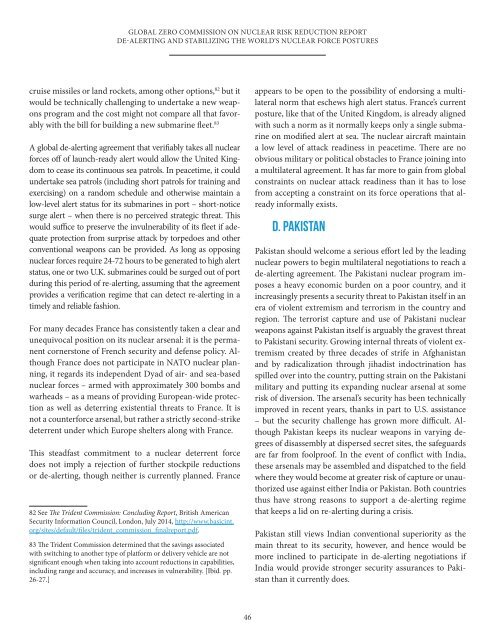global_zero_commission_on_nuclear_risk_reduction_report
global_zero_commission_on_nuclear_risk_reduction_report
global_zero_commission_on_nuclear_risk_reduction_report
You also want an ePaper? Increase the reach of your titles
YUMPU automatically turns print PDFs into web optimized ePapers that Google loves.
GLOBAL ZERO COMMISSION ON NUCLEAR RISK REDUCTION REPORTDE-ALERTING AND STABILIZING THE WORLD’S NUCLEAR FORCE POSTUREScruise missiles or land rockets, am<strong>on</strong>g other opti<strong>on</strong>s, 82 but itwould be technically challenging to undertake a new weap<strong>on</strong>sprogram and the cost might not compare all that favorablywith the bill for building a new submarine fleet. 83A <str<strong>on</strong>g>global</str<strong>on</strong>g> de-alerting agreement that verifiably takes all <strong>nuclear</strong>forces off of launch-ready alert would allow the United Kingdomto cease its c<strong>on</strong>tinuous sea patrols. In peacetime, it couldundertake sea patrols (including short patrols for training andexercising) <strong>on</strong> a random schedule and otherwise maintain alow-level alert status for its submarines in port – short-noticesurge alert – when there is no perceived strategic threat. Thiswould suffice to preserve the invulnerability of its fleet if adequateprotecti<strong>on</strong> from surprise attack by torpedoes and otherc<strong>on</strong>venti<strong>on</strong>al weap<strong>on</strong>s can be provided. As l<strong>on</strong>g as opposing<strong>nuclear</strong> forces require 24-72 hours to be generated to high alertstatus, <strong>on</strong>e or two U.K. submarines could be surged out of portduring this period of re-alerting, assuming that the agreementprovides a verificati<strong>on</strong> regime that can detect re-alerting in atimely and reliable fashi<strong>on</strong>.For many decades France has c<strong>on</strong>sistently taken a clear andunequivocal positi<strong>on</strong> <strong>on</strong> its <strong>nuclear</strong> arsenal: it is the permanentcornerst<strong>on</strong>e of French security and defense policy. AlthoughFrance does not participate in NATO <strong>nuclear</strong> planning,it regards its independent Dyad of air- and sea-based<strong>nuclear</strong> forces – armed with approximately 300 bombs andwarheads – as a means of providing European-wide protecti<strong>on</strong>as well as deterring existential threats to France. It isnot a counterforce arsenal, but rather a strictly sec<strong>on</strong>d-strikedeterrent under which Europe shelters al<strong>on</strong>g with France.This steadfast commitment to a <strong>nuclear</strong> deterrent forcedoes not imply a rejecti<strong>on</strong> of further stockpile reducti<strong>on</strong>sor de-alerting, though neither is currently planned. France82 See The Trident Commissi<strong>on</strong>: C<strong>on</strong>cluding Report, British AmericanSecurity Informati<strong>on</strong> Council, L<strong>on</strong>d<strong>on</strong>, July 2014, http://www.basicint.org/sites/default/files/trident_<str<strong>on</strong>g>commissi<strong>on</strong></str<strong>on</strong>g>_final<strong>report</strong>.pdf.83 The Trident Commissi<strong>on</strong> determined that the savings associatedwith switching to another type of platform or delivery vehicle are notsignificant enough when taking into account reducti<strong>on</strong>s in capabilities,including range and accuracy, and increases in vulnerability. [Ibid. pp.26-27.]appears to be open to the possibility of endorsing a multilateralnorm that eschews high alert status. France’s currentposture, like that of the United Kingdom, is already alignedwith such a norm as it normally keeps <strong>on</strong>ly a single submarine<strong>on</strong> modified alert at sea. The <strong>nuclear</strong> aircraft maintaina low level of attack readiness in peacetime. There are noobvious military or political obstacles to France joining intoa multilateral agreement. It has far more to gain from <str<strong>on</strong>g>global</str<strong>on</strong>g>c<strong>on</strong>straints <strong>on</strong> <strong>nuclear</strong> attack readiness than it has to losefrom accepting a c<strong>on</strong>straint <strong>on</strong> its force operati<strong>on</strong>s that alreadyinformally exists.D. PAKISTANPakistan should welcome a serious effort led by the leading<strong>nuclear</strong> powers to begin multilateral negotiati<strong>on</strong>s to reach ade-alerting agreement. The Pakistani <strong>nuclear</strong> program imposesa heavy ec<strong>on</strong>omic burden <strong>on</strong> a poor country, and itincreasingly presents a security threat to Pakistan itself in anera of violent extremism and terrorism in the country andregi<strong>on</strong>. The terrorist capture and use of Pakistani <strong>nuclear</strong>weap<strong>on</strong>s against Pakistan itself is arguably the gravest threatto Pakistani security. Growing internal threats of violent extremismcreated by three decades of strife in Afghanistanand by radicalizati<strong>on</strong> through jihadist indoctrinati<strong>on</strong> hasspilled over into the country, putting strain <strong>on</strong> the Pakistanimilitary and putting its expanding <strong>nuclear</strong> arsenal at some<strong>risk</strong> of diversi<strong>on</strong>. The arsenal’s security has been technicallyimproved in recent years, thanks in part to U.S. assistance– but the security challenge has grown more difficult. AlthoughPakistan keeps its <strong>nuclear</strong> weap<strong>on</strong>s in varying degreesof disassembly at dispersed secret sites, the safeguardsare far from foolproof. In the event of c<strong>on</strong>flict with India,these arsenals may be assembled and dispatched to the fieldwhere they would become at greater <strong>risk</strong> of capture or unauthorizeduse against either India or Pakistan. Both countriesthus have str<strong>on</strong>g reas<strong>on</strong>s to support a de-alerting regimethat keeps a lid <strong>on</strong> re-alerting during a crisis.Pakistan still views Indian c<strong>on</strong>venti<strong>on</strong>al superiority as themain threat to its security, however, and hence would bemore inclined to participate in de-alerting negotiati<strong>on</strong>s ifIndia would provide str<strong>on</strong>ger security assurances to Pakistanthan it currently does.46


